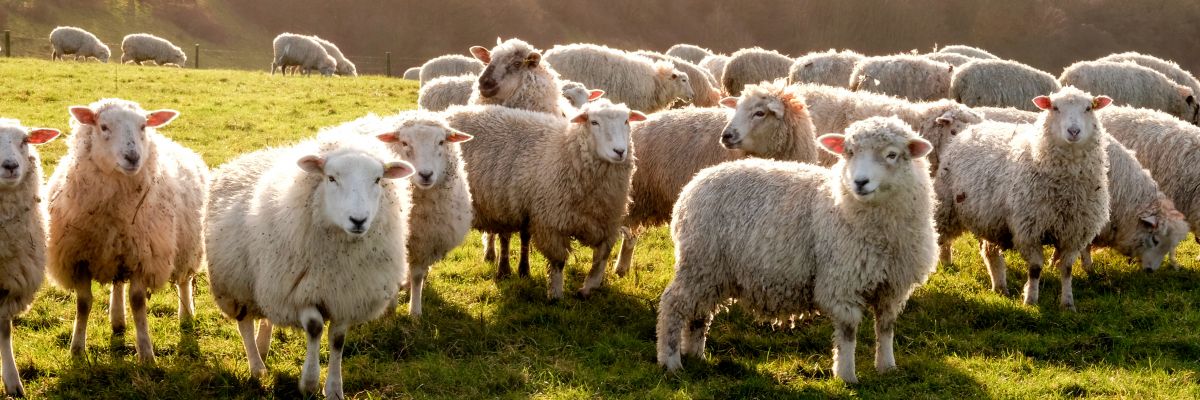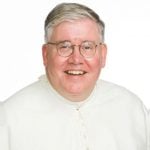
Homily for the Fourth Sunday of Easter, Year A
The sheep hear his voice,
as the shepherd calls his own sheep by name and leads them out.
When he has driven out all his own,
he walks ahead of them, and the sheep follow him,
because they recognize his voice.
But they will not follow a stranger;
they will run away from him,
because they do not recognize the voice of strangers.”
Although Jesus used this figure of speech,
the Pharisees did not realize what he was trying to tell them.-John 10:3-6
How could sheep recognize the voice of their shepherd? One way would be if the shepherd spent time with them individually, one by one, so that the sheep would individually grow accustomed to the shepherd’s voice. This process can happen if the sheep is treated like a pet, as we see in so many representations of the Lord as the Good Shepherd. He even has the little lamb around his neck.
Now, if a shepherd had a very small flock, this method would work well enough. But sheep are herd animals; they are social beasts, so they stick to each other in a group, following where others lead. There are usually just too many for them to know the shepherd’s voice by daily individual meetings. Instead the sheep imitate each other in responding to the shepherd feeding them. They respond to his voice together.
The religion revealed by Jesus Christ, the Good Shepherd, is not an individual, private religion. It is not limited to a personal relationship to Jesus. It is a religion of a society, which is the human equivalent to a flock. It is the religion of the Church—a word that comes from the Greek ecclesia, literally “a calling together.” It is the congregation of followers of the One whose voice has called them to himself.
We are not mere pets; we are sheep of his flock, in the one fold of the Church headed by the one Shepherd. If anything good spiritually can come of the present crisis when the flock is unable to come together under their shepherds as a flock, it is this: we must be ever convinced that to belong to Christ means to belong to his Church, which is not just some religious institution (although it is also that). It means to be one with him all together.
The image of the Church as the Mystical Body of Christ is the best image for this unity. He is the head and we are the members, along with the saints in heaven and our dear departed who await their entry into heaven. Head and Body constitute one thing. It is practically impossible to exaggerate the concrete reality of this truth. The Church is the extension, indeed the fulfillment of God made flesh, made a human body and soul, the divine Body mystically in all his members.
The Body does not listen to the head except in the hidden workings of the relationship of heart and head running the body’s life. But this Body’s members are also individually free. They must clearly hear the voice of the Shepherd and come to him for nourishment and care; and as they come to him together, it is still possible for one or another of them to be lost.
To be separated from Christ’s body, to be a wandering sheep willingly and stupidly straying from him, is to be in a state of great peril of our salvation. That is why Our Lord says that there is more joy over one lost sheep being saved than the ninety-nine who were not lost to begin with.
“Outside the Church there is no salvation.” The whole text of this Gospel lesson teaches this. (You can find a good explanation of this teaching in the Catechism of the Catholic Church.) This expression is not one of threat or of exclusivity, but of anxious care. We must stay close to the Church, to its sacraments and worship, to its teaching found in Holy Writ and in the holy Fathers of the Church who have meditated on these scriptures for millennia. We must seek daily and perseveringly the Lord’s face and the company of his mother and his holy ones in prayer, and—and this is crucially essential—to recognize our fellow members of the Body, our fellow sheep, in our neighbors. They are actually or potentially found in everyone with whom we come into contact, whether virtual or real, whether at six feet of social distance or farther or closer.
No one goes to heaven alone. We are moving toward the feast of the Lord’s Ascension on the fortieth day after his resurrection (or the forty-third if you live on the Left Coast!) He ascended with the multitude of souls, the “other sheep who are not of this flock”— the souls of the departed whom he liberated upon his lightning fast descent into hell, that is, the limbo of the just. They became with him our first heavenly intercessors. They had learned by long waiting all together that they were all one in him, and the Good Shepherd came to seek them out and bring them to heaven to take the places lost by the devil and his angels.
That thief is still about on the earth, seeking the ruin of souls. Let us pray the Good Shepherd to push him into hell by a great, divine thrust, so that all may come unhindered into the sheepfold and none of those now living upon the earth may be lost.
Glory to our Good Shepherd who is always going about the world seeking the salvation of souls in his flock, even his body the Church!



